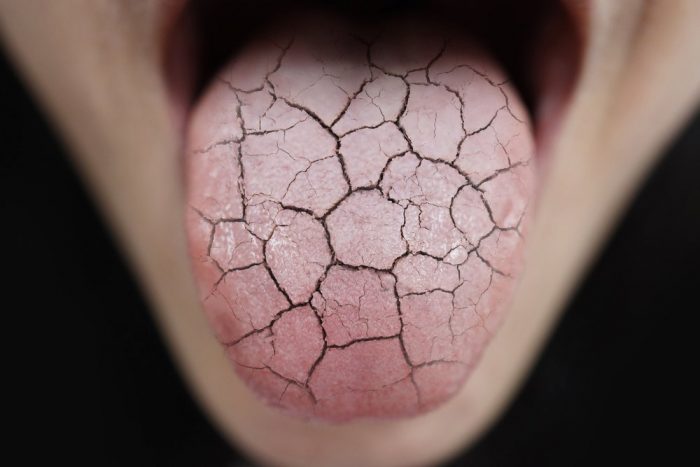
“If you’re feeling dehydrated, just drink some water!” This sounds like solid enough advice, but what if it doesn’t work? It’s a more common experience than one might expect, and the older you are, the more likely you are to get it. Dry mouth, or xerostomia for those medically inclined, is a chronic condition in which not enough saliva is produced to comfortably function. This condition may seem benign, possibly just annoying, but it can lead to severe consequences if left untreated. Read here to know more about dry mouth and find out how to properly utilize our bottled water delivery services to help you!
What Is Dry Mouth?
Dry mouth can be caused by a myriad of different risk factors. Oftentimes, it’s a temporary ailment, only affecting people for a day or two at most before saliva levels return to normal. However, these same risk factors can also be behind more chronic cases if not paid enough mind. If you think you may have dry mouth, consider these possible causes.
Medications
Many medications include dry mouth as a side effect, but the ones most likely to cause issues are those used to treat depression, anxiety, and high blood pressure, as well as some antihistamines, decongestants, muscle relaxants, and pain medications. Chemotherapy and other cancer treatments may also have dry mouth as a side effect.
Drugs and Alcohol
If it gets you high, it may also leave you dry. Tobacco, whether chewed or smoked, can lead to dry mouth. Alcohol and caffeine can also give you dry mouth, with the effects worsening the more you drink. Additionally, some recreational drugs are notorious for giving users a dry mouth, such as marijuana and methamphetamine with their infamous “cottonmouth” and “meth mouth” side effects.
Pre-existing Conditions
Dry mouth can be caused by autoimmune disorders such as Sjogren’s syndrome or HIV/AIDS, as well as medical conditions like diabetes, stroke, yeast infection in the mouth, or Alzheimer’s disease. It can also be caused by snoring or breathing through your mouth or, in rare cases, nerve damage around the head or neck.
Aging
Yep, you might just be old. As stated previously, the older you are, the more likely you are to develop dry mouth.
Symptoms and Consequences
Saliva does more than just keep your mouth moist. If you don’t have enough saliva in your mouth, you’re likely to experience a wide range of unpleasantries. Apart from the staple “dryness” of everything inside of your mouth, you may also have thicker saliva, difficulty chewing and swallowing, difficulty speaking, and/or bad breath. Some people also report a change in taste.
So far, this all just sounds annoying, maybe mildly concerning. However, if left untreated, dry mouth can have dire consequences later on. Saliva helps protect your teeth from cavities and decay, keeps your mouth from developing cracks and ulcers, helps prevent gum infections, and it pre-digests food. In fact, saliva may be a key reason why we process some tastes and textures the way we do. So when dry mouth sets in, your dental health could plummet. Cavities will form faster, plaque will adhere and calcify to teeth, forming tartar, and your breath absolutely will reek.
How to Treat It
Dry mouth is an enigma in that it seems no matter how much water you drink, it will never be enough to rehydrate those parched lips. Even if you were to utilize our water dispensers, then drink all of that water in one day, there’s a higher chance that you would suffer from overhydration than cure your dry mouth. In fact, water may make your throat feel even drier. So, if chugging water like it’s going out of style isn’t the answer, what is?
Well, that’s an answer that’s going to vary depending on your circumstances, and you should definitely discuss your medical history with your doctor or dentist to find out the right course of action for you. However, there are some good options out there for treating dry mouth.
Changing Medications
If your medicine is causing dry mouth, and you just can’t live with that, talk to your doctor about it and they may adjust your dose or even switch your medications entirely.
Oral Moisturization Products
Mouth rinses (prescription or over-the-counter), artificial saliva, and mouth moisturizers are examples of these. Mouthwashes for dry mouth, particularly those containing xylitol, can also be beneficial and help prevent tooth decay.
Saliva-Producing Drugs
Your doctor may prescribe pilocarpine (Salagen) or cevimeline (Evoxac) if your dry mouth is severe enough. These drugs stimulate the salivary glands, increasing saliva production.
Tooth Protection
Your dentist may recommend fluoride trays, which you fill with fluoride and wear over your teeth at night to prevent cavities. As another method of cavity prevention, your dentist may also suggest using a chlorhexidine rinse once a week.
Lifestyle Changes
Though changes in lifestyle may not completely rid you of dry mouth, they can certainly help, as well as ensure that you won’t get it again. In fact, if you’re not suffering from dry mouth, following these guidelines may help you never develop it in the first place.
Drink More Water
It’s recommended that this water not be too hot or too cold. Sugar-free drinks and sucking on ice cubes may also help keep up saliva production. You can use a water tracking app to make sure you are drinking enough water.
Go Sugar-Free
Chewing on chewing gum and sucking on hard candy is already a pleasant experience, but making them sugar-free can also help keep a healthy amount of saliva in your mouth. There’s also research to suggest that the artificial sweetener xylitol may help prevent cavities, but be warned, as consuming high quantities of it can lead to unpleasant side effects involving your bowels.
Don’t Be a Mouth Breather
No, that wasn’t an insult. Breathing through your mouth can cause dry mouth, so try to keep tabs on how often you do that. If you snore at night, consider looking into remedies for that as well. A good start would be to keep the upper body slightly elevated to remove pressure on the chest.
Moisturize
Apply moisturizer to your lips to prevent cracks, and sleep with a humidifier if you’re prone to dryness.
Sources
Agostini, Bernardo Antonio, et al. “How Common is Dry Mouth? Systematic Review and Meta-regression Analysis of Prevalence Estimates.” Brazilian Dental Journal 29 (2018): 606-618.
Glumac, Miodrag, et al. “Saliva Could Act as an Emulsifier During Oral Processing of Oil/fat.” Journal of Texture Studies 50.1 (2019): 83-89.
Sujatha, S., R. Priyadharshini, and Rizwana Azmi. “Dry Mouth: An Emerging Epidemic.” Journal of Datta Meghe Institute of Medical Sciences University 14.3 (2019): 276.
